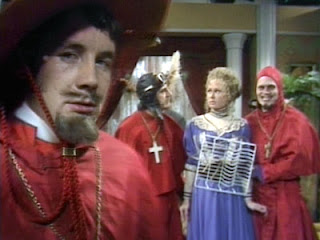 I referred to the Monty Python Spanish Inquisition Sketch the other day (in this post), and that led me to think about its appearance in the film Sliding Doors. Hey, that’s how my mind works.
I referred to the Monty Python Spanish Inquisition Sketch the other day (in this post), and that led me to think about its appearance in the film Sliding Doors. Hey, that’s how my mind works.
For those of you who haven’t seen this film (and I’ve only seen it once, at the time of its cinema release), John Hannah recites lines from the Spanish Inquisition sketch to a table of hysterically impressed friends, including Gwyneth Paltrow – in fact, his Python performance kind of forms part of his wooing of her character in the film. The people around the table are laughing a lot at this bit in the film, including women, which didn’t ring true for me, as I was the kind of spotty indoorsy teenager who’d learn Monty Python sketches off by heart, and as much as women like a laugh and like comedy, very few of them are particularly keen to hear you recite other people’s comedy material. Especially a sketch as reliant on visual aspects and incidental music as that one.
Anyway, as an aspect of the film in which we’re supposed to think Hannah’s character’s funny or likeable, it didn’t work for me. In a similar way, I once found myself watching Showgirls to see if it was as bad as it was said to be (it was), and about twenty minutes in (I think – it was just before the first ad break, and I switched it off then) there was a big song and dance number. The main character, played by Elizabeth Berkeley, watches this show on stage, and is utterly captivated by it. I, on the other hand, thought it was a pretty risible sequence featuring semi-naked people cavorting amidst model volcanoes.
Hmm, those last three paragraphs make it sound as if I’m just having a go at other people to make my point (and I do have one), so let me share a similar confession about my own writing; some years ago, I wrote a novel (unpublished, and with hindsight that’s probably fair) called Fall From Grace. It was essentially a re-telling of the fall of Lucifer, set within a modern-day Evangelical Broadcasting Network – members of staff rebel against the existing regime, get kicked out, seek to take revenge, that sort of thing.
Reader: These religious broadcasts don’t strike me as that awe-inspiring.
Me: Well, they are. Trust me.
Reader: They wouldn’t convert me.
Me: Well, the people in the book are quite taken with them.
Reader: I don’t know why.
Me: Look, they’re really impressed. Take my word for it.
Reader: I suppose I have to, for the story to make sense.
Me: Yes, you do.
Reader: Hmph.
Otherwise, you end up just having to take other characters’ word for it; John Hannah’s character is funny, the show in Showgirls really is impressive, and in my personal example, millions of people do tune in every week to watch a religious TV show… and if you don’t believe what the story wants you to believe, or feel the reaction that you’re apparently expected to feel, you’ll be jerked right out of the experience of the story, and that’s never a good thing.
Looking at how this should be done, I watched the first episode of The West Wing again yesterday, and – possible spoilers ahoy – we don’t get to meet the President himself until very near the end of the episode. Instead of the viewer being told for the best part of an hour that he’s quick-witted, supportive of his staff, and articulate, we’re shown it – President Bartlet demonstrates this in a couple of minutes, and at the end of the scene (indeed the episode) you can see why his staff are so loyal to him. That, as Mr Punch would say, is the way to do it.
The Roman Emperor and philosopher Marcus Aurelius once said “Waste no more time arguing what a good man should be. Be one”, and I think the same applies to aspects of plot or character as detailed above. Is a character meant to be funny? Show them being funny, not other people telling them they’re funny. Is something in a story meant to be amazing or startling, and send people’s lives in a new direction? Then the story needs to show it being amazing or startling.
As is so often the case, I won’t pretend that I’m making a devastating insight about a requirement of writing here; however, I was quite pleased when all the above churned around inside my head, and I finally realised that all of the examples which sprang to my mind all point to one fundamental principle of writing: Show, Don’t Tell.


Leave a Reply